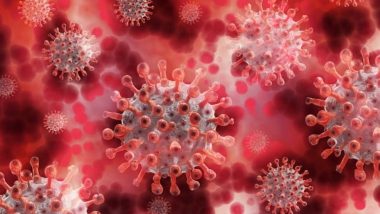Abu Dhabi, July 25: The Middle East Respiratory Syndrome Coronavirus (MERS-CoV), also known as MERS Coronavirus, has once again reared its head, with a recent case being detected in an Abu Dhabi city near the Omani border, as reported by the World Health Organization (WHO). This infectious respiratory illness, caused by MERS Coronavirus, has raised concerns among health authorities worldwide. Here's what you need to know about MERS-CoV, its symptoms, causes, and available treatments.
According to the World Health Organisation (WHO), the MERS Coronavirus was detected in a 28-year-old male residing in Abu Dhabi city, close to the Omani border. The infected individual was admitted to a hospital in the city of Al Ain last month, raising concerns about the potential for further transmission. MERS-CoV Case Detected in UAE: Man Tests Positive for Middle East Respiratory Syndrome Coronavirus in Abu Dhabi, WHO Confirms.
What Is MERS Coronavirus or MERS-CoV?
MERS-CoV is a viral infection that belongs to the coronavirus family, first identified in 2012 in Saudi Arabia. The virus can cause severe respiratory illness, with symptoms ranging from mild cold-like signs to severe pneumonia and acute respiratory distress syndrome (ARDS). The mortality rate for MERS-CoV is estimated to be around 35%, making it a serious health concern. What Is Guillain-Barre Syndrome? From Symptoms to Causes and Treatment, Here's Everything About Rare Neurological Disorder That Has Triggered National Emergency in Peru.
Who Is at Risk?
MERS-CoV can infect people of all ages, but individuals with pre-existing medical conditions such as diabetes, kidney failure, chronic lung disease, or a weakened immune system are at higher risk of developing severe complications if infected. The virus can spread through close contact with infected individuals, especially in healthcare settings.
How Does MERS-CoV Spread?
MERS-CoV is primarily transmitted to humans through close contact with infected camels or through direct contact with respiratory secretions from infected individuals. Human-to-human transmission is also possible, especially in healthcare settings where appropriate infection control measures are not implemented. The virus has a relatively long incubation period, ranging from 2 to 14 days, making it challenging to identify and isolate cases promptly.
Symptoms of MERS-CoV
MERS-CoV presents with a range of symptoms, from mild respiratory illness to severe acute respiratory distress syndrome (ARDS) and organ failure. Common symptoms include fever, cough, and shortness of breath. In severe cases, the disease can progress rapidly, leading to respiratory failure and death.
Prevention and Treatment
The natural reservoir for MERS-CoV is believed to be dromedary camels, as the virus has been detected in these animals in the Middle East. Human infections occur primarily through direct or indirect contact with infected camels. To prevent the spread of MERS-CoV, individuals should avoid close contact with camels, practice good hand hygiene, cover their mouths and noses when coughing or sneezing, and avoid contact with sick individuals.
Currently, there is no specific antiviral treatment for MERS-CoV. Supportive care, including oxygen therapy and treatment for secondary infections, is provided to manage the symptoms and complications.
In conclusion, detecting MERS-CoV in the UAE serves as a reminder of the ongoing global health threats posed by emerging infectious diseases. Public health authorities and international organisations continue to work together to understand and mitigate the risks associated with this deadly virus. Early detection, prompt isolation, and strict infection control measures are crucial in preventing further spread and protecting public health.
(The above story first appeared on LatestLY on Jul 25, 2023 11:07 AM IST. For more news and updates on politics, world, sports, entertainment and lifestyle, log on to our website latestly.com).













 Quickly
Quickly




















